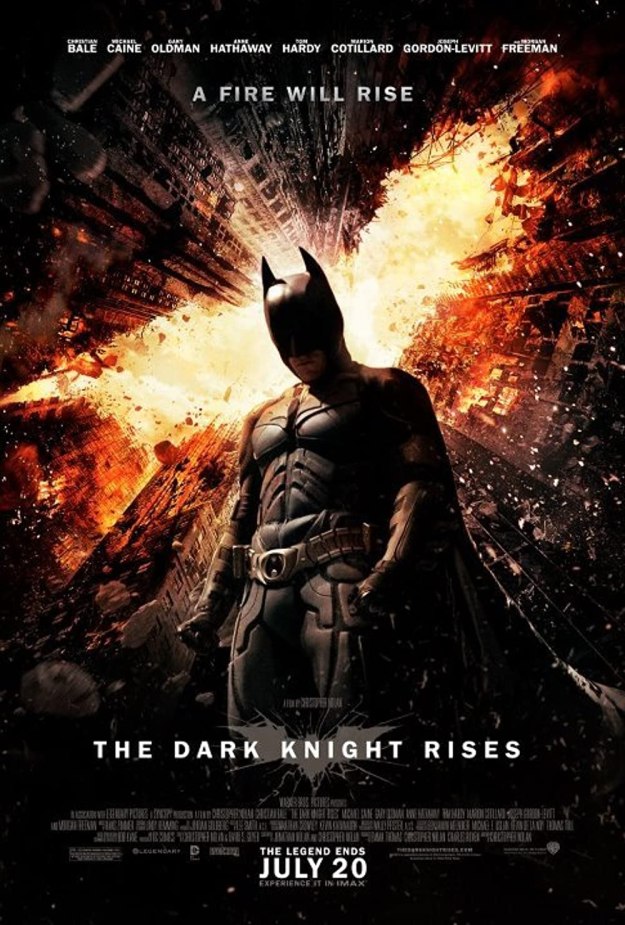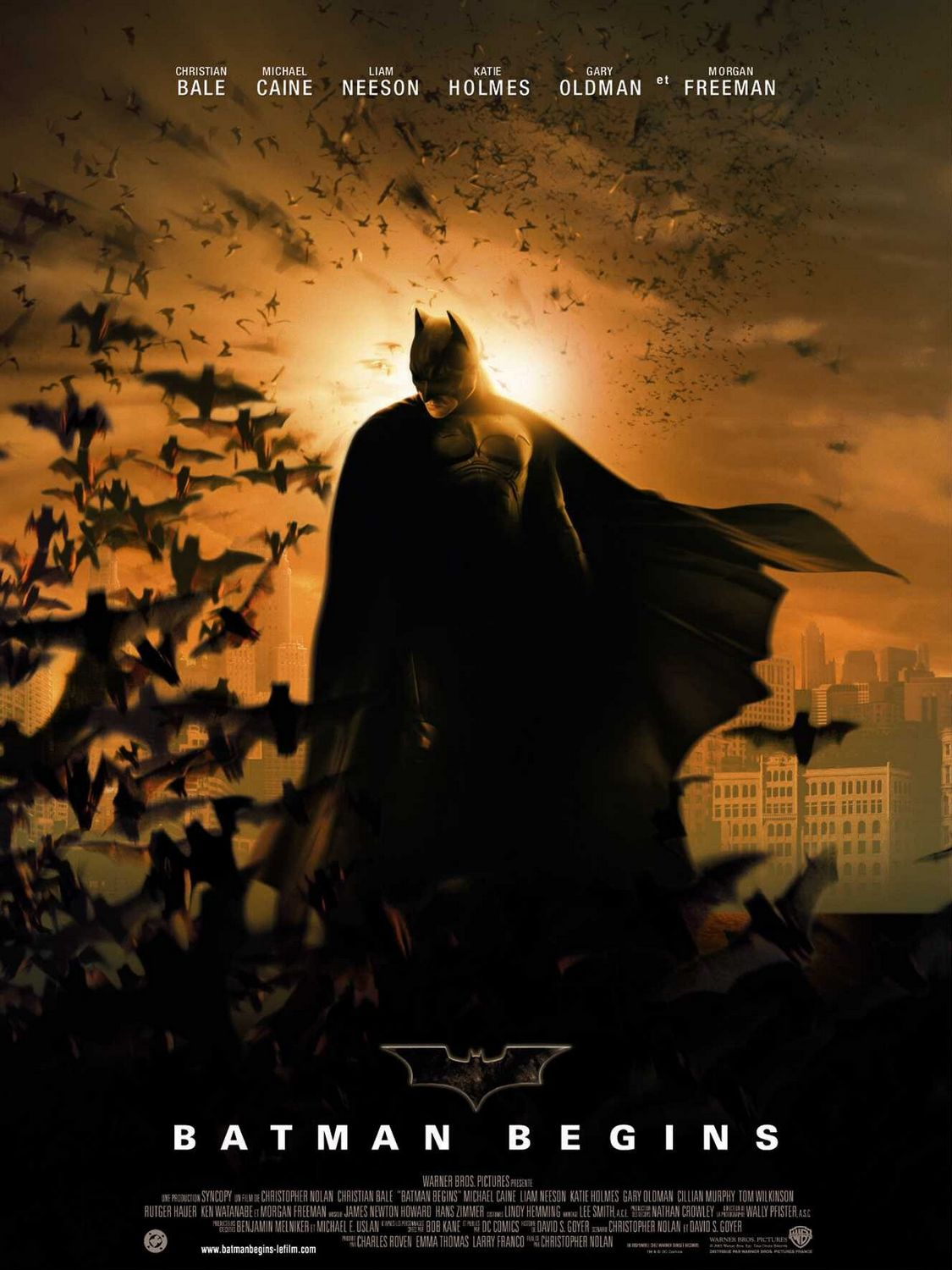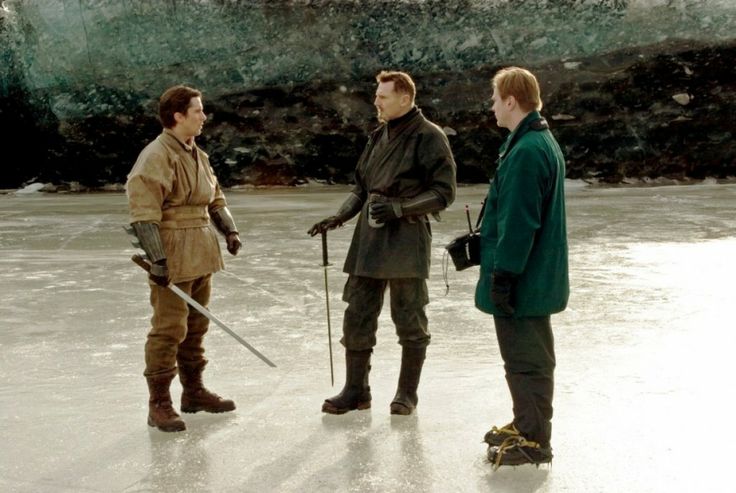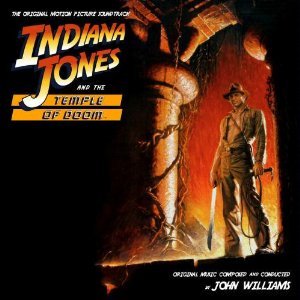I’d like to hire one of those planes that drags advertising banners across the sky, and just fly it around Christopher Nolan’s house whenever he’s writing a new film. The message on the banner: LESS IS MORE.
I really, really want to like this film more than I do. As was quickly becoming the norm around this time (see his previous film Inception and pretty much everything since), The Dark Knight Rises reaches too far and doesn’t all quite work.
There’s so much plot crammed into every scene, you never get a chance to breathe and reflect, even in the rare moments where Hans Zimmer’s busy soundtrack score stops dead – like in the scene where the police march in silence to face Bane. The silence is deafening.
You’d think that Nolan might have learned from the excesses of The Dark Knight. That film is a flawed classic. Great, yes, but if he had shaved 30 minutes off, and maybe lost some of the extraneous sections like the tiresome ferry boat sequence, it would have been a true classic. Instead, Nolan forges ahead with a sequel that is even longer (165 minutes compared to its predecessor’s 152) with far too much going on.
Halfway through a recent rewatch of the film in 4K UHD, I was stunned with the realisation that all of the stuff with Bruce Wayne in the sandy prison and Gotham City in lockdown was still to come. Talk about cramming two or three movies’ worth of plot into one.
A different cut of the film could have started with Bane’s interruption of the NFL game. That alone would have set up a great couple of hours. Instead, that whole plot thread – and the great aesthetic of a snowy Gotham – is rushed over for an audience that’s already seen too much.
Nolan is so obsessed with driving the plot forward – like a shark in water – that he doesn’t even seem to notice when key characters meet their demise. The previous film spent time and effort setting up Nestor Carbonell’s new Mayor of Gotham, but here he’s killed off in the NFL sequence in a blink-and-you-miss-it explosion. ‘Wait, was that..?’ your brain asks, before Nolan stuffs some more exposition into your eyeballs.
It’s not all bad though. I enjoy all of the circular references to Batman Begins – Liam Neeson’s return as Ra’s Al Ghul (with the line ‘My wife…she was taken’ surely a cinematic wink to the actor’s successful franchise), Cillian Murphy’s cameo as The Scarecrow, and a lovely flashback to Gary Oldman looking after the young, newly orphaned Bruce Wayne.
By this point, Nolan’s acting alumni are struggling for screen-time. Michael Caine and Morgan Freeman – both integral to the moral core of The Dark Knight – are reduced to minor characters. And while both of the early films devoted so much time to Christian Bale’s Bruce Wayne, here his character arc fights for attention with newcomers Marion Cotillard, Anne Hathaway and Joseph Gordon-Levitt.
One of the most interesting elements of the film is the choice to have the voice of Tom Hardy’s Bane feature so high in the sound mix. Prefacing the furore that would surround Nolan’s muddy audio treatment in Tenet, not all of Bane’s lines are audible. This is a shame as it all sounds so unique, if a little hokey at times. And even the character of Bane feels rushed, with his backstory crammed into a couple of flashbacks, and another blink-and-you-miss-it death.
For the soundtrack, Hans Zimmer continues with what he’d built up with James Newton Howard on the previous films. Howard turned down the chance to return, believing he’d feel like a third wheel after Zimmer’s successful collaboration with Nolan on Inception. Howard’s gentler, melodic ear is noticeably absent in a score that is far too hectic, yet one that perfectly fits the ADHD plotting of the film.
Hit: On Thin Ice
Hidden Gem: Rise





 It sounds like the sort of thing you’d read on a scam Facebook post, but last month I won a 65” 4K UHD Sony Bravia. It wasn’t out of sheer luck though, or from a Niarobi prince who needed help transferring his millions into a New Zealand bank account. I took part in a ten-week, 100-question film quiz run by a local film-related website. All that movie-watching has finally paid off big time.
It sounds like the sort of thing you’d read on a scam Facebook post, but last month I won a 65” 4K UHD Sony Bravia. It wasn’t out of sheer luck though, or from a Niarobi prince who needed help transferring his millions into a New Zealand bank account. I took part in a ten-week, 100-question film quiz run by a local film-related website. All that movie-watching has finally paid off big time. My favourite of the three films though is the first one. Released in 2005, it very nearly passed me by. Like most people, I was put off by the thought of another Batman film after Joel Schumacher had all but run the franchise into the ground with 1997’s Batman & Robin. I even remember being sat in a bar in Manchester’s Castlefield, when our good friends Vini and Bucko told us to wake up and go see it.
My favourite of the three films though is the first one. Released in 2005, it very nearly passed me by. Like most people, I was put off by the thought of another Batman film after Joel Schumacher had all but run the franchise into the ground with 1997’s Batman & Robin. I even remember being sat in a bar in Manchester’s Castlefield, when our good friends Vini and Bucko told us to wake up and go see it.
 The new Batmobile, the Tumbler, is awesome and the chase away from the police mid-way through the film might just be one of the greatest action sequences of the decade. It’s a perfect sequence, and doesn’t even feature an antagonist, relying purely on Batman’s need to evade the Gotham PD.
The new Batmobile, the Tumbler, is awesome and the chase away from the police mid-way through the film might just be one of the greatest action sequences of the decade. It’s a perfect sequence, and doesn’t even feature an antagonist, relying purely on Batman’s need to evade the Gotham PD.
 The other night, after a hard week at work, I sat down to watch Kingsman: The Golden Circle with my wife. I wasn’t expecting much – I hadn’t heard good things – but I wasn’t prepared for how stunningly average it was. Would I say it is a bad film? No, not really. It was technically well made, by a more than competent director (Matthew Vaughn), but it was instantly forgettable.
The other night, after a hard week at work, I sat down to watch Kingsman: The Golden Circle with my wife. I wasn’t expecting much – I hadn’t heard good things – but I wasn’t prepared for how stunningly average it was. Would I say it is a bad film? No, not really. It was technically well made, by a more than competent director (Matthew Vaughn), but it was instantly forgettable. You wait twenty-five years for a True Romance soundtrack to be released on vinyl, and then two turn up at once. Already this year, we’ve had
You wait twenty-five years for a True Romance soundtrack to be released on vinyl, and then two turn up at once. Already this year, we’ve had  I’m starting to come around to Hans Zimmer. I’d previously written him off as a workaday composer, but I’m starting to appreciate the occasional hidden gem amongst his many scores (137 and counting). His soundtracks for Christopher Nolan (particularly Batman Begins and The Dark Knight) have been my favourite action scores this side of the turn of the century – perfectly blending digital sounds within a traditional orchestral score.
I’m starting to come around to Hans Zimmer. I’d previously written him off as a workaday composer, but I’m starting to appreciate the occasional hidden gem amongst his many scores (137 and counting). His soundtracks for Christopher Nolan (particularly Batman Begins and The Dark Knight) have been my favourite action scores this side of the turn of the century – perfectly blending digital sounds within a traditional orchestral score.